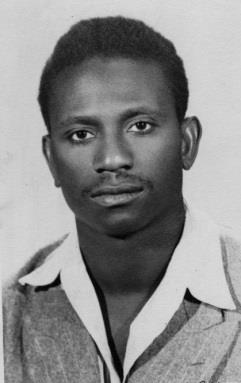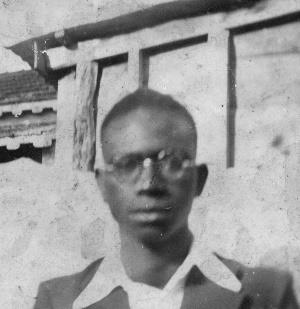Cheikh Anta Diop facts for kids
Quick facts for kids
Cheikh Anta Diop
|
|
|---|---|

Diop as a university student in Paris in the late 1940s
|
|
| Born |
Seex Anta Jóob (in wolof)
29 December 1923 |
| Died | 7 February 1986 (aged 62) |
| Nationality | Senegalese |
| Occupation | Historian, anthropologist, physicist, politician |
Cheikh Anta Diop (born December 29, 1923 – died February 7, 1986) was an important Senegalese historian, anthropologist, physicist, and politician. He spent his life studying the beginnings of the human race and African culture before colonialism (when European countries took control of African lands).
Diop's ideas are very important to the theory of Afrocentricity. This idea suggests that African people and their history should be at the center of how we understand the world. Even though he never called himself an Afrocentrist, his work helped shape this way of thinking. He also questioned if there was a cultural bias (unfairness based on culture) in scientific research. His questions greatly influenced how people studied African civilizations after the colonial period.
Diop believed that African people shared a common culture that was more important than the differences found in their languages or traditions over time. Some of his ideas have been debated, with some scholars saying they were based on older information or outdated ideas about race. However, others have defended his work, saying it has often been misunderstood.
Today, Cheikh Anta Diop University in Dakar, Senegal, is named after him.
Early Life and Education
Cheikh Anta Diop was born in Thieytou, in the Diourbel Region of Senegal. He came from a respected Muslim Wolof family. In Senegal, he received a traditional Islamic education. He also completed the French high school diploma, called the baccalauréat, before moving to Paris, France, to continue his studies.
Studies in Paris
In 1946, when he was 23, Diop moved to Paris to study at the University of Paris. He first studied advanced mathematics. Later, he switched to philosophy and earned his first degree in philosophy in 1948. He then studied chemistry and received two diplomas in that subject in 1950.
Diop was very interested in African culture. In 1948, he helped create a special magazine edition about contemporary African culture. He wrote an article asking, "When will we be able to speak of an African Renaissance?" He suggested that African culture should be rebuilt based on ancient Egypt. He believed this was similar to how European culture was built on the ideas of ancient Greece and Rome.
Diop also studied nuclear physics in Paris, starting in 1957. He even translated parts of Einstein's Theory of Relativity into his native Wolof. During his time in Paris, Diop studied many subjects, including History, Egyptology, Physics, Linguistics, Anthropology, Economics, and Sociology.
In his 1954 doctoral thesis, Diop argued that ancient Egypt was settled by Black people. He also suggested that the Egyptian language and culture later spread to West Africa. When he published these ideas in his book Nations nègres et culture (Negro Nations and Culture), he became one of the most talked-about historians of his time. He earned his doctorate degree in 1960.
Later Career and Impact
In 1971, Diop became a member of the UNESCO International Scientific Committee. This committee was tasked with writing a General History of Africa. Diop wrote the first chapter, which focused on the origins of the ancient Egyptians.
In this chapter, he presented evidence to support his idea that Ancient Egyptians were closely related to people from Sub-Saharan Africa. He pointed to things like shared blood groups, body shapes seen in ancient Egyptian art, and studies of melanin (skin pigment) in mummies. He also noted similarities between Egyptian and African cultures, such as shared beliefs and traditions.
Diop's conclusions at the UNESCO symposium received mixed reactions. Some scholars strongly disagreed, while others fully supported his ideas. His work continues to be discussed and studied today.
See also
 In Spanish: Cheikh Anta Diop para niños
In Spanish: Cheikh Anta Diop para niños
 | Mary Eliza Mahoney |
 | Susie King Taylor |
 | Ida Gray |
 | Eliza Ann Grier |


